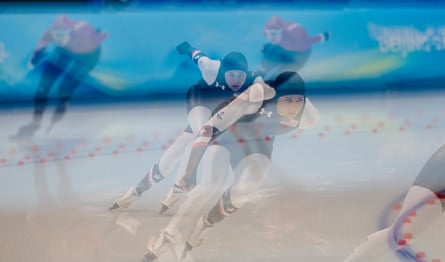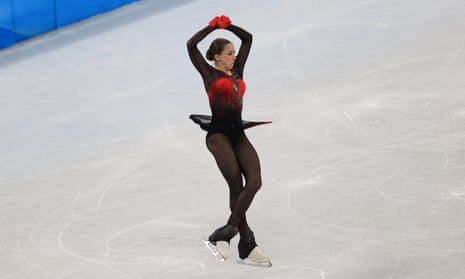As she has laid waste to her rivals throughout an extraordinary first season as a senior while skating with deeper maturity and sophistication in each passing competition, it’s been increasingly apparent that only an act of God could prevent the Russian prodigy Kamila Valieva from winning figure skating’s most prestigious title.
On Monday, the 15-year-old Valieva offered the world a sneak peek of why next week’s Olympic women’s singles competition is little more than a formality, becoming the first woman to land a quadruple jump at the Olympics – then doing it again moments later – to punctuate the Russian Olympic Committee’s runaway gold in the team event at Capital Indoor Stadium.
Valieva, the newly minted Russian and European champion who has already broken the world records for the women’s short programme, free skate and combined total in a stunning debut campaign as an adult skater, opened her title-clinching long program on Monday with a gigantic quad salchow before following with a quad toe loop in combination with a triple toe loop.
Her final score of 178.92 was more than enough to prevail in Monday’s free skate, nailing down a gold that was safely in hand even before Valieva’s first-place finish in the short on Sunday single-handedly wiped out the Americans’ day-one lead.
“I had [the] burden of responsibility, but I came out a winner,” Valieva said. “It’s been quite overwhelming. I was very nervous, but I am just glad I was able to execute all of my elements well. To perform with a team like this means everything.”
Valieva’s dominance on Monday, which followed her Russian team-mates Anastasia Mishina and Aleksandr Galliamov’s win in the pairs’ free skate, left the United States and Japan in a touch-and-go battle for silver.
Ultimately, the Americans were able to lock down second place with 65 points through the ice dance pair of Madison Chock and Evan Bates, whose personal-best score of 129.07 in the free dance helped secure the United States’ best ever finish in the team event. The medal proved sorely needed on a Monday when three of Team USA’s warmest medal contenders finished off the podium entirely: Mikaela Shiffrin in the giant slalom, Red Gerard in the snowboard slopestyle and Brittany Bowe in the speed skating 1500m.

Japan finished with 63 points to reach the team podium for the first time, safely ahead of fourth-place Canada (53), after Kaori Sakamoto took second to Valieva in the free skate and Riku Miura and Ryuichi Kiara followed suit in the pairs’ free.
On a morning that almost entirely followed to form, the biggest wrinkle came off the ice when it was announced American skater Vincent Zhou tested positive for Covid-19 on the eve of the men’s singles competition, which begins on Tuesday with the short program.
Zhou’s positive test was later confirmed and he emotionally revealed he was pulling out of the Games later on Tuesday. “I’ve already lost count of the number of times I’ve cried today,” he said. “But I’m happy to say that at least one of those times was happy tears, and that was when I found out that I became an Olympic silver medalist.”.
Zhou, the mercurial 2019 world bronze medalist whose free skate on Sunday helped secure the United States’ team silver, was one of the few entrants in the men’s contest with the technical repertoire of quadruple jumps necessary to challenge the likes of Nathan Chen, Yuzuru Hanyu and Shoma Uno for the gold.

Comments (…)
Sign in or create your Guardian account to join the discussion